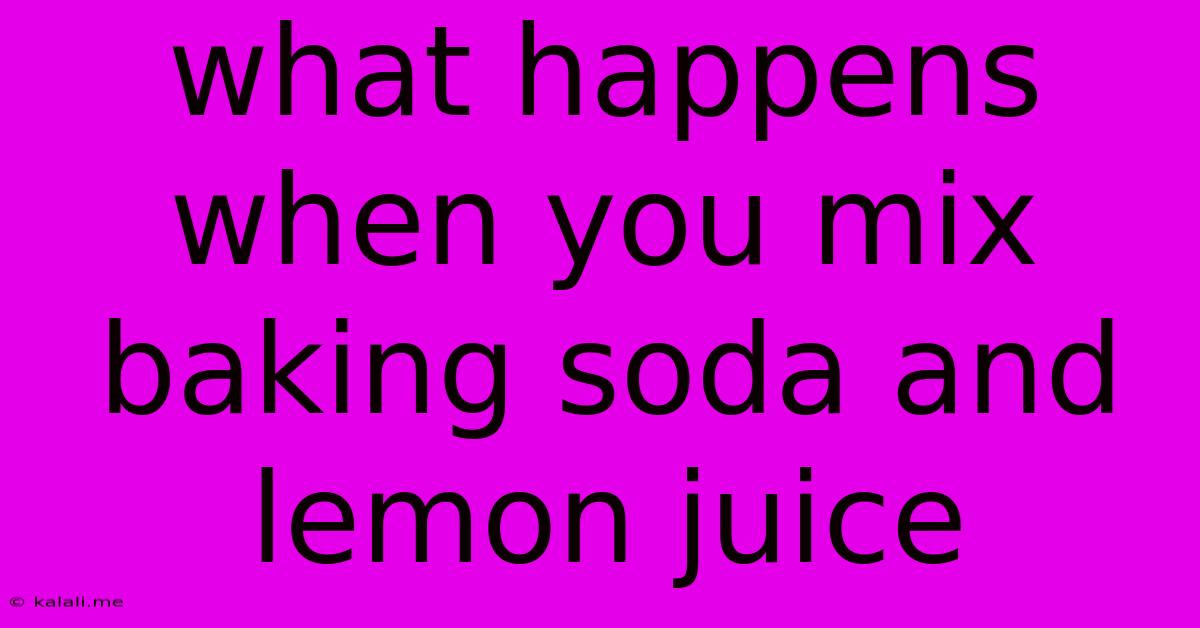What Happens When You Mix Baking Soda And Lemon Juice
Kalali
Jun 14, 2025 · 3 min read

Table of Contents
The Amazing Fizz: What Happens When You Mix Baking Soda and Lemon Juice?
Ever wondered what happens when you combine baking soda and lemon juice? The dramatic fizzing reaction is undeniably fascinating, but what's actually going on at a chemical level? This article delves into the science behind this popular kitchen experiment, exploring its uses and applications beyond just a fun science project.
The reaction you observe is a classic example of an acid-base reaction, also known as a neutralization reaction. Baking soda (sodium bicarbonate, NaHCO₃) is a base, while lemon juice, containing citric acid, is an acid. When these two substances meet, they react to produce carbon dioxide gas (CO₂), water (H₂O), and a salt (sodium citrate). This release of carbon dioxide is what causes the familiar bubbling and fizzing.
The Science Behind the Fizz: A Detailed Look
The chemical equation for the reaction is:
3NaHCO₃ (baking soda) + C₆H₈O₇ (citric acid) → 3CO₂ (carbon dioxide) + 3H₂O (water) + Na₃C₆H₅O₇ (sodium citrate)
This equation shows that three molecules of baking soda react with one molecule of citric acid to produce three molecules of carbon dioxide, three molecules of water, and one molecule of sodium citrate. The carbon dioxide gas is less dense than air, causing it to escape as bubbles. The resulting mixture is less acidic than the original lemon juice.
Practical Applications of the Baking Soda and Lemon Juice Reaction
This seemingly simple reaction has numerous practical applications, both in the kitchen and beyond:
-
Cleaning: The fizzing action can help to loosen dirt and grime, making it ideal for cleaning various surfaces. The mild abrasiveness of baking soda, combined with the acidity of lemon juice, creates a powerful yet safe cleaning solution. You can use this mixture to clean countertops, sinks, and even some cookware.
-
Baking: While not directly used in the baking process itself (as the reaction would occur before baking), understanding this reaction is crucial in baking. Baking soda requires an acid to activate and release carbon dioxide gas, which helps baked goods rise.
-
Deodorizing: The reaction can neutralize odors. This is particularly useful in removing unpleasant smells from refrigerators or garbage disposals. The carbon dioxide gas helps to displace the odor-causing molecules.
-
Removing stains: The combined power of baking soda and lemon juice can be effective in removing certain stains from clothes and surfaces. The acidic nature of the lemon juice helps break down stains, while the baking soda aids in lifting them away.
-
DIY Beauty Products: This mixture can be found in homemade beauty products like face masks and toothpastes. The mildly abrasive nature of baking soda and the natural properties of lemon juice offer purported skin-brightening and whitening effects.
Safety Precautions
While generally safe, there are a few precautions to keep in mind when using this mixture:
- Avoid eye contact: The mixture can irritate eyes. Always wear safety goggles if handling large quantities.
- Test on a small area first: Before applying to a large surface, test on a small inconspicuous area to ensure it doesn't damage the material.
- Do not ingest: The mixture is not for consumption.
In conclusion, the reaction between baking soda and lemon juice is a fascinating example of chemistry in action, with numerous practical applications that extend beyond a simple science experiment. Understanding the underlying science helps us appreciate the versatility of these common household ingredients.
Latest Posts
Latest Posts
-
What Is The Integral Of Sin 2x
Jun 14, 2025
-
What Is Conjugate Base Of H2po4
Jun 14, 2025
-
College Of San Mateo Acceptance Rate
Jun 14, 2025
-
Economics Is Best Defined As The Study Of
Jun 14, 2025
-
Which Of The Following Is Not An Example Of Symbiosis
Jun 14, 2025
Related Post
Thank you for visiting our website which covers about What Happens When You Mix Baking Soda And Lemon Juice . We hope the information provided has been useful to you. Feel free to contact us if you have any questions or need further assistance. See you next time and don't miss to bookmark.